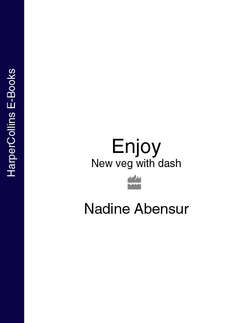Читать книгу Enjoy: New veg with dash - Nadine Abensur - Страница 8
How I Cook
ОглавлениеThere are a few tricks to good cooking and they come with practice. I’d like to discuss them at the beginning of this book so that you can remember them as you go on. Of course, you might know them like the back of your hand already; you might have been born to them or you might just have a deep, intuitive sense of what is right. You just know when something is done: you look with your eyes and smell with your nose, touch with your fingers and listen with your ears. You enjoy eating – the biggest key – and you have the ability to translate the experience of your taste buds into the actual practice of cooking: the adjustment of heat, the addition of spices, the marriage of ingredients, the all-important timing-all the things that kitchen-bound generations understood instinctively.
We live in a society of buzzwords and glossy pictures, which fail to capture the heart of real food. We’ve had at least a decade of al dente this and that, of vegetables waved over a naked flame in the name of speed and modernity or to make them more photogenic. We’ve had a glut of ‘assembly food’, of recipes that barely seem to require our active presence and involvement in the kitchen, and we are in danger of forgetting some fundamentals.
In the recipes in this book, I’ll often ask for the food to be very well browned, properly caramelised, allowed to simmer at length. I will practically beg you to cook your vegetables till they are very soft (which never means soggy), aware that for a long time you have been instructed only to steam them so that they retain that apparently desirable crunch. This may be appropriate for a quickly thrown-together stir-fry but it’s not right for a tagine or a braise, a casserole or a roast. Neither is it suitable for pulses, which should be so soft that they dissolve when pressed with the tongue against the palate. There is no speeding this up, except by using a pressure cooker. No chickpea, lentil, or any other pulse for that matter should have even the slightest toughness to it. If you are told otherwise, it’s wrong and it won’t taste good. End of story.
Don’t try to apply the rules of Asian cooking to the food of the Middle East, and vice versa. They are very, very different. To give you one example, it’s no good treating an aubergine in a Middle Eastern recipe as if it were a carrot in an Asian one. The former needs a copious quantity of hot oil, the latter will work in only a little. One needs to be very soft and browned, the other should have bite. Don’t eat a piece of aubergine that looks insipid and half raw. You won’t enjoy it so, whatever you do, don’t cook it that way.
Slow cooking, the lynchpin of so much Mediterranean and Middle Eastern food, draws out layers of flavour, a depth of taste that you simply will not get by searing things in a hot pan for a minute or so. And get over the fear of oil. In some of these recipes you will have to use oil liberally, but remember that good-quality olive and macadamia oils are fantastically good for you.
Ditto salt. People have often watched me cook in a class, then reproduced the dish exactly so that it looked identical to mine, yet still it lacked roundness. Whenever I probe, I discover fear of salt at the root of this. Of course you don’t have to go overboard, but salt brings flavours together in a way that hits the spot. Paradoxically, you may find that you need to eat less when your food is perfectly seasoned th n when it’s bland. I sometimes find myself chasing after taste, hoping the next mouthful will reveal all. But it doesn’t work like that.
Cooking and eating are about sustenance, pleasure, delight and joie de vivre. They are about good-quality ingredients, so fresh you can still feel the pulse of life in them. They are about feeding the people you love. It makes sense that you should want your cooking to be as good as possible, that you continually seek inspiration.
Everyone enjoys eating good food and everyone can learn to enjoy cooking it. Do go to people who know their own food well. Try out as many ethnic restaurants as you can, go to hands-on cookery classes, get stuck in, practise, and above all enjoy.
